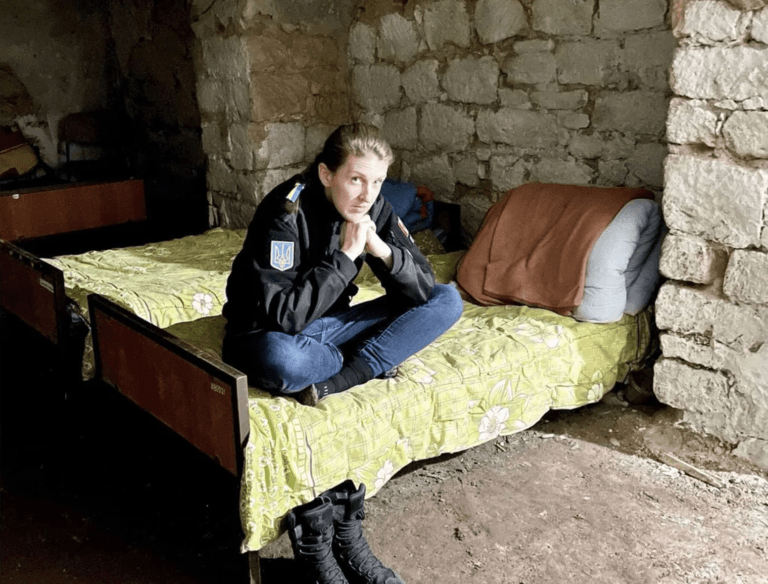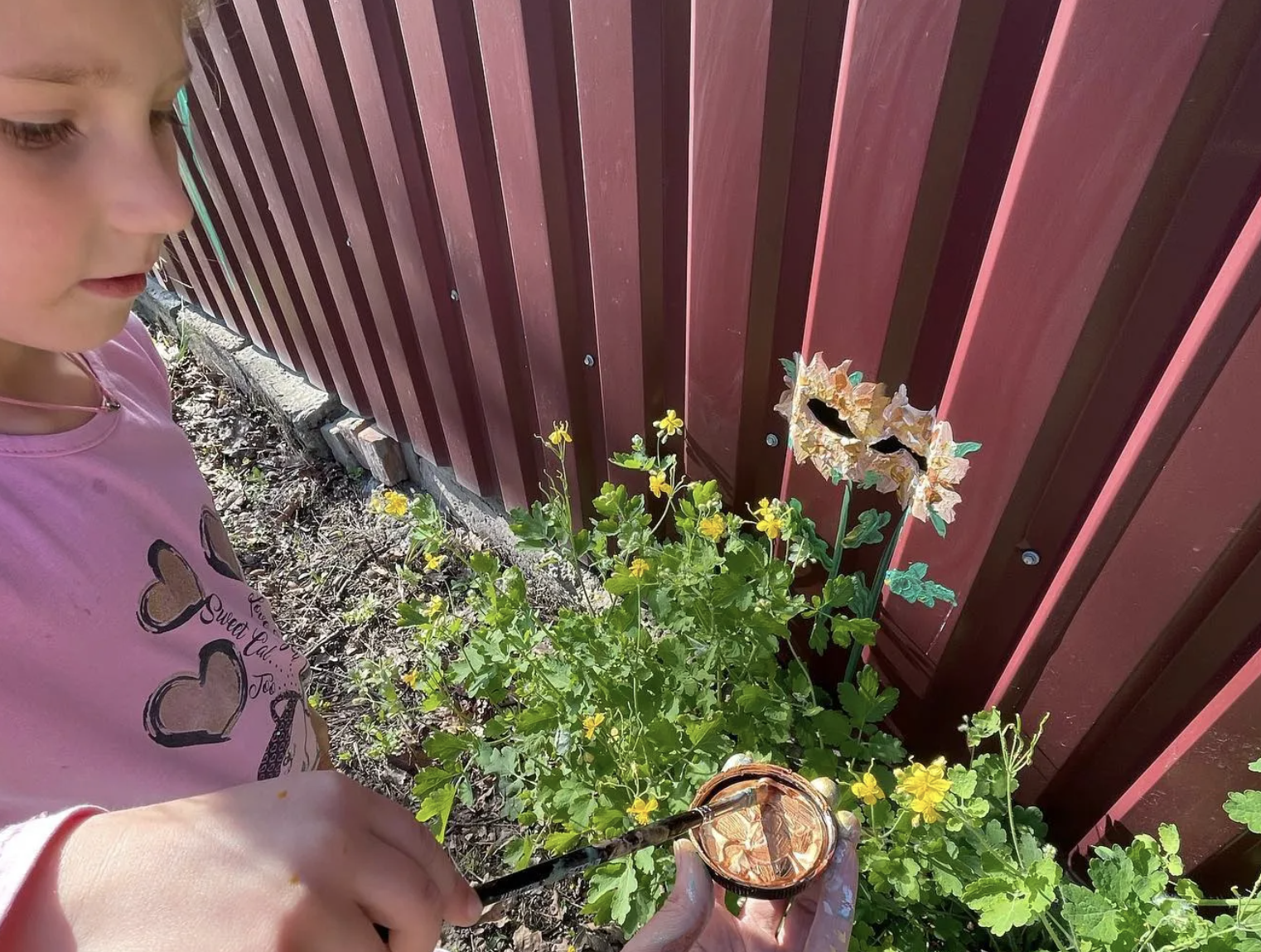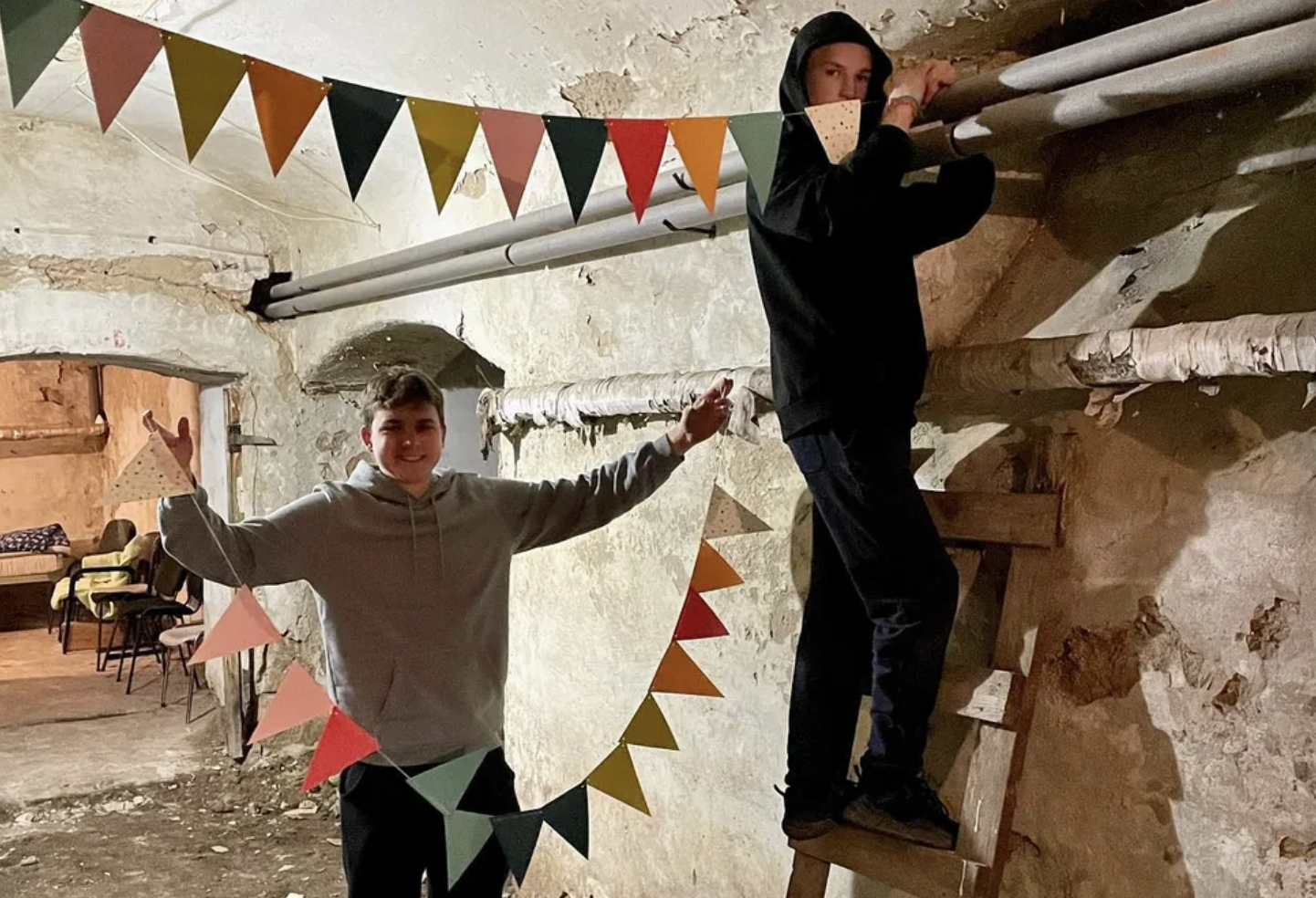Nothing prepared me for what I saw in Ukraine
When war broke out in Ukraine I went to help in any way I can, including transporting babies safely across the border. I have nightmares of what I witnessed—and plan to go back.

Volunteering in a Ukrainian orphanage located in an underground bomb shelter (Photos courtesy Ivanka Siolkowsky/Instagram)
Share
When Russia invaded Ukraine in March, Ivanka Siolkowsky, aka the Tidy Moose—a Ukrainian-Canadian author and professional organizer living in Toronto—didn’t wait long to pack her bags. Within a week, she flew to Poland to volunteer on the border, and later ventured into Ukraine itself. From rebuilding the roofs of bombed buildings to helping unaccompanied Ukrainian minors cross the border into Poland, Siolkowsky worked without the help of an organization. This is her story.
I don’t think any Ukrainian on the planet slept during the first night of the war.
Our eyes were glued to our TVs—in my case, my phone. I knew that night that I couldn’t just sit and do nothing, and that I would end up in Ukraine. I ended up going that first week.
I didn’t have a plan—I was just winging it. I was a bit nervous, but also knew I would find things to do and people to help. I speak the language. I’ve been several times. I knew I could offer some level of assistance, I just didn’t know what that would be.
READ: How three sisters (and their mom) tried to swindle the CRA out of millions
I flew to Poland and volunteered at the border in Medyka, mostly assisting unaccompanied minors who were crossing the border in search of safety. In the chaos at the border, women crossing with their children were understandably reluctant to trust foreign soldiers to bring them to safety, or to help carry their babies. That’s where I came in.
Since the women were more apt to trust me, I would help children crossing over unaccompanied. They had nothing but a phone number written on their bodies and a note that said, “Please call me when my child arrives safely.” Ukraine has always been high on the list of countries where trafficking takes place—and that’s during non-war times. Women and children fleeing their country led to traffickers to come out in high numbers, knowing it would be much easier to carry out their crimes once they crossed the border out of Ukraine. It’s appalling.
View this post on Instagram
I also crossed back and forth into Ukraine delivering humanitarian aid—food, tactical gear, and so on. I would cross over with the aid, then cross back with children into Poland.
I didn’t work with an organization. I worked solo, because I very quickly saw many cracks in the systems being put into place—a lot of red tape preventing help from being delivered, in some cases. There was a situation during one of the evacuations where a team turned back because it was unsafe. Although I understand their reasoning, and the mindset of “We can’t help anyone if we’re injured…or dead,” my focus was on helping when most needed. The children’s safety was always my priority. Was that smart? I’m not sure. In fact, I’m sure in some cases throughout my time in Poland and Ukraine it wasn’t.
I’m a professional organizer and productivity consultant back in Canada, so I pay close attention to detail. I was able to notice things other people may not have. Most people didn’t notice when a child or teen was travelling alone. They all came over in large groups, so it was not easy to determine. In the end, everyone did the best that they could to provide help in whatever way they were able to. That’s all you can ask for. It was nice to see how people from all over the world worked together to help. If we’re looking for a positive takeaway from all of this horror, I would say that’s definitely one.
I spent just over two weeks at the border before getting sick with pneumonia. Turns out sleeping in cars and on floors in minus-10 degree weather can really take its toll. I didn’t want to take a bed away from a refugee, so I did what most volunteers did and found a place to sleep wherever I could. I don’t regret it, but I do regret not being smarter about my methods. Admittedly I didn’t take care of myself as much as I did others, and in the end I paid for that. It reminded me of the saying: You can’t fill from an empty cup. I flew home the last week of March and got treated for my pneumonia back in Toronto.
Once I was given the all clear from my doctor to return, I flew back in the second week of April—only this time I flew to Germany, then made my way to the Polish-Ukrainian border, crossed over by foot and hitchhiked further into Ukraine.
This time around I traveled around to different cities throughout Ukraine, providing humanitarian aid on all levels. Some days evacuating children from the East and bringing them to safety in the West; other days repairing houses destroyed by shelling; other days volunteering in orphanages. I did so many different jobs, I don’t even remember them all. Each day was different.
I ended my trip in Bucha, where I met a man who whose son had been tortured and murdered, and whose house was bombed to the ground. His story is not unique. The man said he couldn’t even walk down the street without seeing reminders of the loss he’d endured, like bullet holes in his fence. He told me he was going to leave, and I wanted to give him one more happy memory before he did. I got some paint and started painting flowers over the bullet holes. A neighbour, a little girl, came out to help me. Eventually, I painted flowers over bullet holes on the whole block.

I spent time with orphans in an underground bomb shelter, which taught me a lot about resilience. Even though children should never have to experience what these children experienced, I was beyond-impressed by their tenacity to keep going, even though their lives were turned upside down. I remember the first few days in the shelter, the children were taking care of me more than I was taking care of them, it seemed. Their routine down there was incredible. The children were looking after one another, and making sure nobody felt scared or uncomfortable.
You would see nine year-olds taking care of four year-olds, and 15 year-olds taking care of the nine year-olds. It was at that point that I realized they didn’t “need” me. They were taking care of themselves and then some.

Ukrainians are a strong people. My job became more of an emotional one, in the sense that I was there to cheer them up, and remind them that it was ok for them to be kids. I packed a giant inflatable pink unicorn costume, and boy, did we have fun with that. It didn’t take long before one of the children said, “We should take this to the square and raise money for the Ukrainian army.” It was as if they had their fun, and now it was time to get back to reality and give back. It both warmed and broke my heart.
As far as a negative memory, there were many. One that stands out is a moment is a time a bomb exploded so close to me, my insides vibrated. That’s all I’m comfortable sharing about that.
Overall, I visited 19 cities in two months. I am back in Canada now. I thought it would be wise to come home and regroup. I needed a mental break. Truthfully, though, all I feel is guilt that I’m not in Ukraine at this moment. I’m also having a lot of nightmares from things that I saw. Things I’ll never unsee.
Still, I may return to Ukraine for one year. The Russian invasion is still happening, and Ukrainians need our help. They can’t do it alone, nor should they have to. It’s our obligation to help, because they’re not just fighting for themselves and their freedom—they’re fighting to defend democracy and freedom throughout the world. I wish more world leaders would realize that and take actual action instead of offering “thoughts and prayers.”
Time will tell, but wherever I am in the world, I will not stop supporting Ukraine’s efforts to defend themselves and their freedoms.
Слава Україні!